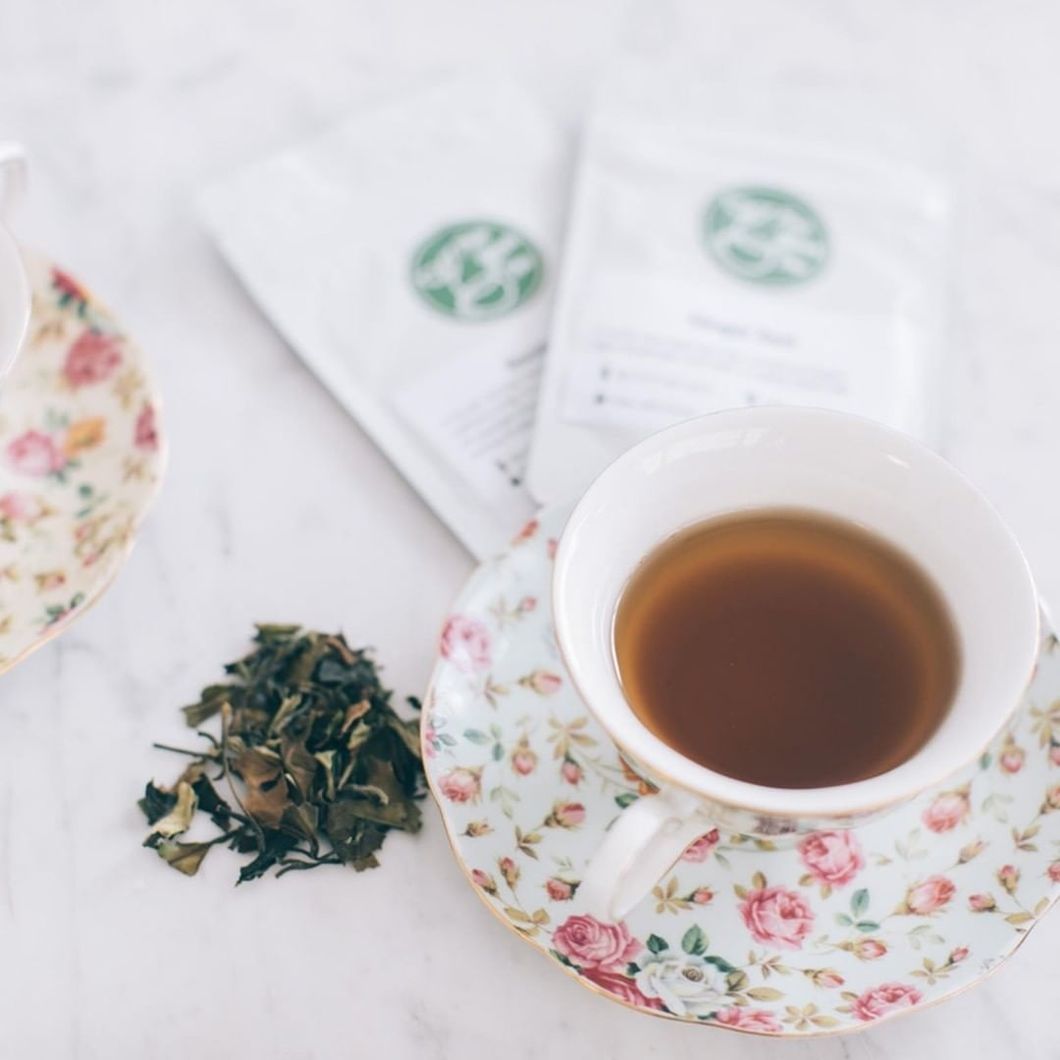Over the past few years, detox tea programs have risen to popularity, specifically among young women. They appear to be simple weight loss solutions – not crazy dieting or exercising, just tea drinking. There are numerous detox tea companies out there, one being Skinny Fit.
The advertisement on SkinnyFit's website is mostly hype, providing minimal information. It does list of antioxidant-rich herbal blend of ingredients in the teas and other products. Still, most of the statements on the website are just claims designed to make readers excited about using the teas and accompanying products. This detox tea advertisement appears to target woman looking for an easy way to lose weight without having to diet or exercise. It has a feminine color scheme and the models and user testimonials are all women. It makes weight loss sound extremely easy: "Save yourself the effort and time of going through complicated detoxes and diets that require you to make drastic changes. SkinnyFit is so simple, you just have to drink it daily!" Readers are asked to purchase a bundle of SkinnyFit's "Energizing Tea Blend" to drink every morning along with their "Nighttime Detox Blend" to drink every night. Different kinds of pills, drink powders, and collagen blends, each having a specific purpose, are also offered to aid in the tea detox and claimed weight loss and burning of fat. Other claims made in the advertisement include boosted energy, immunity, and metabolism as well as decreased bloating. Phrases such as "natural," and "non-GMO" are bolded and highlighted in an attempt to make the products sound more attractive to readers.
SkinnyFit tea recommends making healthy lifestyle changes along with the use of the detox tea bundle and accompanying products. The advertisement specifically notes that users should start making "better eating patterns and choices." Making healthy lifestyle changes is a realistic and sustainable recommendation. However, the program does not give any guidance on how to do so. There is no given caloric intake guidelines or macronutrient breakdown recommendation. It does not provide examples of what a healthy, balanced diet should consist of (whole grains, fruits, vegetables, lean proteins, healthy fats, etc.).
According to the Mifflin – St. Jeor equation for calculating basal metabolic rate, a 28-year old female being 5' 6" and weighing 198 pounds has a BMR of 1597 kcals, which rounds up to about 1600 kcals per day. Looking at the macronutrients, it is recommended that 45-65% of daily caloric intake comes from carbohydrates, less than or equal to 35% from fats, and 10-35% from protein (Summerfield, 2016). The total daily caloric intake increases based on the level of additional physical activity and macronutrient breakdown adjusts accordingly. That being said, with a BMR of roughly 1600 kcals, 720 kcals – 1040 kcals consumed daily should come from carbohydrates (180 – 260 g), less than or equal to 560 kcals from fats (62 g or less), and 160 – 560 kcals from protein (40 – 140 g).
As mentioned, the SkinnyFit program does not provide any specific dietary guidelines. Even though the program claims that dieting is not necessary, its recommendation of "making better food patterns and choices" can influence some users to begin dieting. Dieting creates a caloric deficit. This is good for weight loss but can have adverse consequences on a person's BMR if daily caloric intake goes below 1200 kcals. At less than 1200 kcals per day, a person enters the fasted state, which causes the metabolism to slow down. The body becomes starved and food seeking behaviors will become apparent, which could include urges to binge. On the other hand, some users may not feel a need to make any changes to their current eating habits, since the advertisement does claim dieting and exercise are not necessary. Continuing to eat a normal diet and meet their energy requirements will put users in the fasting state, potentially increasing their BMR and causing a reduction in food seeking behaviors. Eating beyond their required intakes, though, will result in further weight gain.
There is evidence that green tea may aid in weight loss. Green tea is a component of most tea detox blends like SkinnyFit. It contains caffeine and the chemical compound epigallocatechin gallate (EGCG). A randomized double-blind study published by Levy, Narotzki, and Reznick (2016) looked at the effects of green tea on weight loss with the addition of physical activity. The study took sixteen subjects from two different physical activity groups, totaling thirty-two subjects total. Some were given green tea supplements while others were given placebos. By the end of the twelve-week long study, it was concluded that subjects who consumed green tea in addition to adhering to the exercise program exhibited greater weight loss than those who did not. This may be due to EGCG and caffeine found in green tea decreasing the accumulation of adipose tissue while, at the same time, increasing both fat oxidation and thermogenesis.
The antioxidant blends in detox teas may be effective in reducing free radicals in the body, but may also have potentially negative outcomes. According to Klein (2014), while there is no evidence that the use of detox tea results in weight loss, there is evidence that the programs can result in adverse health conditions. These conditions include but are not limited to vitamin deficiencies, electrolyte imbalances, lactic acidosis, and, in extreme cases, death. The detox tea industry continues to go unregulated, allowing them to use high concentrations of antioxidant, as well as both diuretic and laxative components. These concentrations can be extremely dangerous to a consumer's health.
I someone came to me with an advertisement for SkinnyFit or any other type of detox tea program, I would inform the person that detox tea programs are not effective alone. Personally, I am against detox tea programs because they are dangerous and a waste of money. Changes must be made in relation to diet and physical activity in order to create a safe caloric deficit for weight loss. SkinnyFit and other detox tea programs do not provide any information on how to exercise or eat healthy for weight loss and, therefore, should not be looked to as solutions. There are also health hazards that go along with the use of unregulated herbal and antioxidant blends that are not worth the risk. The best way to lose weight and promote long-term weight maintenance is to educate a person about what a balanced diet is and the importance of physical activity. It is also crucial to provide individualized guidelines on how much the person should eat daily, including a proper macronutrient breakdown, for the person to gain an even better understanding.
Detox tea programs are advertised all over social media, promising to be a simple, easy, and quick weight loss solution. They do not, however, inform readers about additional lifestyle changes needed to accomplish the claims they make. There is no evidence supporting detox tea programs being effective while there is evidence suggesting potential dangers and health risks associated with their use. Detox tea programs are not a weight loss solution but rather a money waster. They do more damage than good and should not be used.



















